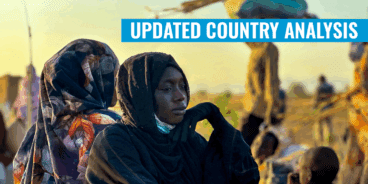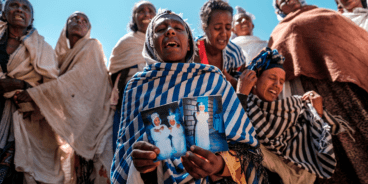
Joint NGO Letter Addressing the Pervasive Human Rights Crisis in Ethiopia
(Geneva)
RE: Addressing the pervasive human rights crisis in Ethiopia
Your Excellency,
The undersigned civil society organisations write to draw your attention to persistent and grave violations of human rights in Ethiopia and the pressing need to support the establishment of an independent, impartial and international investigation into atrocities committed by security forces to suppress peaceful protests and independent dissent.
As the UN Human Rights Council (UN HRC) prepares to convene for its 35th session from 6 – 23 June 2017, we urge your delegation to prioritise and address through joint statements the ongoing human rights crisis in Ethiopia.
In the wake of unprecedented, mass protests that erupted in November 2015 in Oromia, Amhara, and the Southern Nations Nationalities and Peoples (SNNPR) regional states, Ethiopian authorities routinely responded to legitimate and largely peaceful expressions of dissent with excessive and unnecessary force. As a result, over 800 protesters have been killed, thousands of political activists, human rights defenders, journalists and protesters have been arrested, and in October 2016, the Ethiopian Government declared a six-month nationwide State of Emergency, that was extended for an additional four months on 30 March 2017 after some restrictions were lifted.
The State of Emergency directives give sweeping powers to a Command Post, which has been appointed by the House of People’s Representatives to enforce the decree, including the suspension of fundamental and non-derogable rights protected by the Ethiopian Constitution, the African Charter on Human and Peoples’ Rights, and other international human rights treaties to which Ethiopia is party. More information on the human rights violations occurring under the current State of Emergency is included in the Annex at the end of this letter.
Lack of independent investigations
Few effective avenues to pursue accountability for abuses exist in Ethiopia, given the lack of independence of the judiciary – the ruling EPRDF coalition and allied parties control all 547 seats in Parliament.
Ethiopia’s National Human Rights Commission, which has a mandate to investigate rights violations, concluded in its June 2016 oral report to Parliament that the lethal force used by security forces in Oromia was proportionate to the risk they faced from the protesters. The written Amharic version of the report was only recently made public, and there are long-standing concerns about the impartiality and research methodology of the Commission. On 18 April 2017, the Commission submitted its second oral report to Parliament on the protests, which found that 669 people were killed, including 63 members of the security forces, and concluded that security forces had taken “proportionate measures in most areas.” Both reports are in stark contrast with the findings of other national and international organisations, including Amnesty International and Human Rights Watch. The Global Alliance of National Human Rights Institutions has rated the Commission as B, meaning the latter has failed to meet fully the Paris Principles.
Refusal to cooperate with regional and international mechanisms
In response to the recent crackdown, the UN High Commissioner for Human Rights, Zeid Ra’ad Al Hussein, has called for “access for independent observers to the country to assess the human rights situation”, and recently renewed his call for access to the country during a visit to the capital, Addis Ababa. Ethiopia’s government, however, has rejected the call, citing its own investigation conducted by its Commission. UN Special Procedures have also made similar calls.
In November 2016, the African Commission on Human and Peoples Rights adopted a resolution calling for an international, independent, and impartial investigation into allegations of the use of excessive and unnecessary lethal force by security forces to disperse and suppress peaceful protests. Recent European parliament and US Congressional resolutions have also called for independent investigations. The Ethiopian embassy in Belgium dismissed the European Parliament’s resolution citing its own Commission’s investigations into the protests.
As a member of the UN HRC, Ethiopia has an obligation to “uphold the highest standards” of human rights, and “fully cooperate” with the Council and its mechanisms (GA Resolution 60/251, OP 9), yet there are outstanding requests for access from Special Procedures, including from the special rapporteurs on torture, freedom of opinion and expression, and peaceful assembly, among others.
Recommendations
During the upcoming 35th session of the UN HRC, we urge your delegation to make joint and individual statements reinforcing and building upon the expressions of concern by the High Commissioner, UN Special Procedures, and others.
Specifically, the undersigned organisations request your delegation to publicly urge Ethiopia to:
- urgently allow access to an international, thorough, independent, impartial and transparent investigation into all of the deaths resulting from alleged excessive use of force by the security forces, and other violations of human rights in the context of the protests;
- respond favourably to country visit requests by UN Special Procedures,
- immediately and unconditionally release journalists, human rights defenders, political opposition leaders and members as well as protesters arbitrarily detained during and in the aftermath of the protests;
- ensure that those responsible for human rights violations are prosecuted in proceedings which comply with international law and standards on fair trials; and
- fully comply with its international legal obligations and commitments including under the International Covenant on Civil and Political Rights, the African Charter on Human and Peoples’ Rights, and its own Constitution.
With assurances of our highest consideration,
Sincerely,
- Association for Human Rights in Ethiopia
- CIVICUS: World Alliance for Citizen Participation
- Civil Rights Defenders
- DefendDefenders (East and Horn of Africa Human Rights Defenders Project)
- Ethiopia Human Rights Project
- Freedom House
- Front Line Defenders
- Global Centre for the Responsibility to Protect
- Human Rights Watch
- International Federation for Human Rights (FIDH)
- International Service for Human Rights
- Reporters Without Borders
- World Organisation Against Torture (OMCT)
ANNEX: BACKGROUND
A repressive legal framework
The legal framework in Ethiopia restricts the enjoyment of civil and political rights, and therefore the activity of the political opposition, civil society, and independent media in the country.
The Charities and Societies Proclamation (2009) caps foreign funding at 10% for non-governmental organisations working on human rights, good governance, justice, rule of law and conflict resolution. The law has decimated civil society and human rights activism in the country. Currently, a handful of independent human rights organisations continue to operate, but with great difficulty.
The Anti-Terrorism Proclamation (2009) has been used repeatedly to silence critical voices. Political opposition party leaders and members, people involved in public protests, religious freedom advocates and journalists have been arrested and charged under this law. Both laws are a matter of great concern and have been repeatedly raised in international forums, including at Ethiopia’s Universal Periodic Review (UPR) in 2014.
Overarching restrictions under the State of Emergency
The State of Emergency directives restrict the organisation of political campaigns, demonstrations, and any communication that may cause “public disturbance.” It also bans communications with foreign governments and NGOs that may undermine ‘national sovereignty, constitutional order and security’, and the right to disseminate information through traditional and social media. Additionally, the Command Post was given sweeping powers to arbitrarily arrest and detain individuals without due process.
A few weeks before the State of Emergency was extended by an additional four months, the government announced it was lifting some of these restrictions, including the Command Post’s power to arbitrarily arrest people or conduct property searches without warrants, curfews, and certain restrictions regarding sharing of information online and offline.
Despite some improvements in internet access since mobile data services were restored throughout parts of the country on 2 December 2016, social media platforms such as Whatsapp, Facebook and Twitter remain inaccessible except through VPNs.
Mass arrests
Since the declaration of the State of Emergency, the Command Post announced that tens of thousands have been arbitrarily arrested and transported to different detention centers throughout the country. Most of the detainees were held for a period of around three months in Awash, Alage, Bir Sheleko, and Tolay police and military camps. In November 2016, authorities announced the release of 11,607 people who were detained under the State of Emergency following “rehabilitation training programs.” One month later, authorities announced they were releasing an additional 9,800 detainees. Former detainees have reported being subjected to torture, harsh prison conditions, and other forms of ill treatment. In late March 2017, the Command Post announced through state media that 4,996 of the 26,130 people detained for allegedly taking part in protests would be brought to court.
Continued targeting of the political opposition, the media and civil society
According to the Association for Human Rights in Ethiopia, three of Ethiopia’s main opposition parties, the Unity for Democracy and Justice Party (UDJ), Blue Party, and All Ethiopian Unity Party (AEUP) have claimed that a large number of their members were targeted by Command Post and arbitrarily arrested.
On 30 October 2016, Dr. Merera Gudina, a professor and prominent opposition leader of the Oromo Federalist Congress was arrested after his return from Brussels where he provided testimony on the current political crisis to some members of the European Parliament and described human rights violations being committed in Ethiopia. On 3 March 2017, prosecutors formally charged Dr. Merera with a bid to “dismantle or disrupt social, economic and political activity for political, religious and ideological aim […] under the guise of political party leadership”. Dr. Merera was also accused of meeting with an organisation designated as a terrorist group contravening restrictions contained in the State of Emergency directives.
Members of the Wolqait Identity Committee, including Colonel Demeqe Zewude, have also faced allegedly politically motivated criminal charges under the 2009 Anti-Terrorism Proclamation. Their attempted arrest sparked protests in the Amhara capital of Gondar in August 2016.
On 18 November 2016, journalists Elias Gebru and Ananiya Sori were arrested by security forces, according to the Association for Human Rights in Ethiopia. Both were reportedly arrested in relation to their criticism of government policies and actions. Ananiya was released on 13 March 2017. At the time of writing, Elias is still being held in prison without due process of law.
On 6 April 2017, Ethiopia’s Supreme Court ruled that two bloggers from the Zone 9 collective previously acquitted of terrorism charge should be tried instead on charges of inciting violence through their writing. If convicted of the charge, Atnaf Berhane and Natnael Feleke would face a maximum prison sentence of 10 years. The court also upheld the lower court’s acquittal of two other Zone 9 bloggers, Soleyana S Gebremichael and Abel Wabella.
Related Publications


Populations at Risk, November 2025
